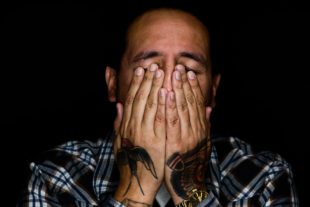How to Recognize the Symptoms of Anxiety
Christian Counselor Spokane
 Symptoms of anxiety are normal. According to the National Institute of Mental Health (2017), 6.8 million Americans struggle with anxiety sometime in their lifetime. When we go through illness, relationship tension, break-ups, trauma, lose a significant loved-one, are excluded from social functions, bullied, feel lonely, experience financial problems, or problems at or with work we most likely will feel nervous, uneasy, worried, or anxious.
Symptoms of anxiety are normal. According to the National Institute of Mental Health (2017), 6.8 million Americans struggle with anxiety sometime in their lifetime. When we go through illness, relationship tension, break-ups, trauma, lose a significant loved-one, are excluded from social functions, bullied, feel lonely, experience financial problems, or problems at or with work we most likely will feel nervous, uneasy, worried, or anxious.
Sometimes, despite all our efforts to use the calming and coping skills we possess, the negative feelings consume us and overtake our lives. It is when this occurs that Kollman (2015) warns us we move out of the normal limits and our anxiety becomes a disorder.
Definition of Anxiety
According to the American Psychological Association (2018), anxiety is defined as a state of uneasiness, fear, and apprehension about future uncertainties; it does not matter whether they are real or fantasized. When feelings of anxiety become excessive and people stop performing at their best, they inflate threats out of proportion, or when normal everyday activities are restricted we move out of the normal limits and our anxiety becomes a disorder, say Dynes (2001) and Kollman (2015). If you are experiencing these symptoms, please reach out to a mental health professional for help.
Causes of Anxiety
Sometimes we know why we become anxious; other times, anxiety creeps up on us and catches us off-guard. Bourne (2015) states that anxiety stems from changes in our brain, environmental stressors, and genes. Research states anxiety is caused by:
- Anti-anxiety medications (benzodiazepines) or other medications
- Chronic pain
- Diabetes
- Drug misuse or withdrawal
- Heart disease
- Irritable bowel syndrome
- Rare tumors that produce certain fight-or-flight hormones
- Respiratory disorders (i.e. chronic obstructive pulmonary disease (COPD) and asthma)
- Thyroid problems (i.e. hyperthyroidism)
- Withdrawal from alcohol
Other causes of anxiety include:
- Blood relatives with an anxiety disorder: Anxiety disorders can run in families.
- Drugs or alcohol: Use, misuse, or withdrawal of drugs or alcohol can cause or worsen anxiety.
- Other mental health disorders: People with other mental health disorders often also have an anxiety disorder.
- People with certain personality types are more prone to anxiety disorders than others.
- Stress due to an illness: Having health conditions or a serious illness can cause significant worry about issues such as your treatment and your future.
- Stress buildup: A big event or a buildup of smaller stressful life challenges may trigger excessive anxiety (i.e. a death in the family, life changes, ongoing financial worry, or work,).
- People who endured abuse, trauma, or witnessed traumatic events as children are at higher risk of developing an anxiety disorder. In addition, adults who experience a traumatic event may also develop anxiety disorders.
Symptoms of Anxiety
Anxiety sometimes makes us feel we are going crazy. Because we don’t want anyone to think less of us, we make every attempt to hide it. However, avoiding our anxiety keeps us feeling anxious and may significantly disrupt our lives. Being able to identify our symptoms and making peace with them helps us move forward.
The following is a comprehensive list of anxiety symptoms according to specialists in the field:
- aching jaws

- blurred vision
- can’t concentrate or think
- can’t control worry
- chest pain
- cold, sweaty, numb or tingling hands or feet
- compulsion
- depression
- dizziness
- dry mouth
- electric shock feeling
- exhaustion
- facial tics
- fear of impending doom
- feeling jumpy
- feeling like you are going crazy
- feeling like you have no control
- having an increased heart rate
- headaches
- high blood pressure
- impotence
- irritability
- lack of confidence
- lack of interest
- moodiness
- nausea
- obsessions
- palpitation
- panic
- paranoia
- passiveness
- phobia
- rapid breathing
- rapid thoughts
- ringing in ears
- shaking
- shooting pains in the face
- shortness of breath
- sleep problems
- stomach upset (indigestion, unable to eat)
- sweating
- tearfulness
- tense muscles or muscular spasms
- unable to stay calm and still
- unable to rest or concentrate
- uneasiness
- weakness in legs
- withdrawing
Types of Anxiety
Now that you are aware of the causes and symptoms of anxiety, let’s look at the various types of anxiety. It is comforting to identify the type of anxiety you might be experiencing for the purpose of making sense of how we are feeling. According to the Diagnostic and Statistical Manual of Mental Disorders 5th Edition, or DSM-5 (2013), there are various types of anxiety:
- Agoraphobia: anxiety disorder in which a person fears and avoids places or situations which might cause them to panic and make them feel trapped, helpless or embarrassed (i.e. going to a movie).
- Anxiety disorder due to a medical condition: intense anxiety or panic directly caused by a physical health problem (i.e. trembling in Parkinson’s disease).
- Generalized anxiety disorder: persistent and excessive anxiety and worry about activities or events, even ordinary, routine issues. The worry is out of proportion to the actual circumstance, is difficult to control, and affects how you feel physically and emotionally. It often occurs along with other anxiety disorders or depression.
- Panic disorder (panic attacks): repeated episodes of intense anxiety, fear or terror that reach a peak within minutes. Symptoms often present similarly to those of a heart attack. These panic attacks can lead to worrying about them happening again and therefore, people attempt to avoid situations in which they’ve occurred.
- Selective mutism: a consistent failure to speak. Occurs in children and in certain situations (i.e. school) despite being able to speak in other situations. It often interferes with school and other social functions.
- Separation anxiety disorder: a developmentally inappropriate and excessive fear or anxiety concerning separation from those to whom the individual is attached.
- Social anxiety disorder (social phobia): high levels of anxiety, discomfort, fear, and avoidance of social situations due to feelings of embarrassment, self-consciousness, and concern about being judged or viewed negatively by others (i.e. giving a speech, meeting unfamiliar people).
- Specific phobias: intense anxiety when one is exposed to a specific object or situation which people tend to avoid. Can incite panic attacks in some people.
- Substance-induced anxiety disorder: symptoms of intense anxiety or panic associated with the misuse of drugs, taking medications, being exposed to a toxic substance or withdrawal from drugs.
- Other specified anxiety disorder and unspecified anxiety disorder: anxiety or phobias that don’t meet the criteria for any other anxiety disorder but are significant enough to be distressing and disruptive.
What the DSM-5 has to Say about Anxiety
 In order to be diagnosed with Generalized Anxiety Disorder (GAD) the DSM-5 (2013) uses the following criteria:
In order to be diagnosed with Generalized Anxiety Disorder (GAD) the DSM-5 (2013) uses the following criteria:
1. Excessive anxiety and worry (apprehensive expectation), occurring more days than not for at least 6 months, about a number of events or activities (such as work or school performance).
2. The individual finds it difficult to control the worry.
3. The anxiety and worry are associated with three (or more) of the following six symptoms (with at least some symptoms having been present for more days than not for the past 6 months). Note: Only one item required for children.
- Restlessness, feeling keyed up or on edge.
- Being easily fatigued.
- Difficulty concentrating or mind going blank.
- Irritability.
- Muscle tension.
- Sleep disturbance (difficulty falling or staying asleep, or restless, unsatisfying sleep).
4. The anxiety, worry, or physical symptoms cause clinically significant distress or impairment in social, occupational, or other important areas of functioning.
5. The disturbance is not attributable to the physiological effects of a substance (e.g., a drug of abuse, a medication) or another medical condition (e.g., hyperthyroidism).
6. The disturbance is not better explained by another medical disorder (e.g., anxiety or worry about having panic attacks in panic disorder, negative evaluation in social anxiety disorder [social phobia], contamination or other obsessions in obsessive-compulsive disorder, separation from attachment figures in separation anxiety disorder, reminders of traumatic events in posttraumatic stress disorder, gaining weight in anorexia nervosa, physical complaints in somatic symptom disorder, perceived appearance flaws in body dysmorphic disorder, having a serious illness in illness anxiety disorder, or the content of delusional beliefs in schizophrenia or delusional disorder).
Anxiety Warning Signs
It is important to treat symptoms of anxiety, since having an anxiety disorder can also lead to or worsen other mental and physical conditions such as:
- Asthma
- Coronary disease
- Depression (which often occurs with an anxiety disorder) or other mental health disorders
- Digestive or bowel problems
- Headaches and chronic pain
- Impotence
- Lethargy
- Poor quality of life
- Problems functioning at school or work
- Psoriasis
- Social isolation
- Substance misuse
- Suicide
- Trouble sleeping (insomnia)
- Ulcers
Treatment for Anxiety
As you will read, there are multitudes of ways when dealing with symptoms of anxiety. No one way is wrong. We are all unique and no one therapy will work for everyone. Whatever you do, don’t lose hope. You will overcome this obstacle. You are strong. You are resilient. You are courageous. I mean, look at you; you are already looking for ways to help yourself.
- Bourne (2015) recommends the following treatments for anxiety: relaxation training, cognitive behavior therapy (CBT), worry exposure, reducing worry behaviors, problem-solving, distraction, medication, mindfulness practice, and lifestyle and personality changes.

- CBT is a short-term treatment that focuses on teaching people how to use specific skills to improve their symptoms. It is the most widely employed form of treating anxiety disorders. CBT includes exposure therapy, in which a person is gradually exposed to the distressing object or situation which triggers their anxiety for the sole purpose of building confidence and managing their fears. Kollman (2015) endorses the use of CBT, stating that more than 85% of patients are panic-free after treatment. He encourages people to directly face their feelings in a systematic manner. He states that anxiety fades when we go through it instead of running away from it.
- Tirch (2012) recommends we use Compassion-Focused Therapy (CFT) in addressing our anxiety. He posits that by bringing out the threat and self-protection system, the drive and excitement system, and the contentment and social safeness system one can heal emotionally and mentally.
- Marra (2004) suggests we apply Dialectical Behavior Therapy (DBT) to address anxiety. By utilizing DBT, one can accept that two opposing truths can exist at the same time. For example, an individual may want to make positive changes to their lives at the same time of being scared of making those changes.
All literature addressing anxiety also recommends that you:
- Avoid alcohol, smoking, and recreational drugs as they can cause or worsen anxiety.
- Consult a doctor or pharmacist before taking over-the-counter medications or herbal remedies as many contain chemicals that can make anxiety symptoms worse.
- Cut down on foods and drinks high in caffeine (i.e. coffee, tea, cola, energy drinks, chocolate, etc.). Caffeine is a mood-altering drug and may make symptoms of anxiety disorders worse.
- Do a hobby to distract you.
- Eat healthily. Eat vegetables, fruits, whole grains, and fish.
- Start slowly, gradually increasing the amount and intensity of your exercise. Brisk aerobic exercises (i.e. jogging and biking) help release brain chemicals that cut stress and improve your mood.
- Keep a journal to identify what’s causing your stress and what seems to help you feel better.
- Learn what triggers your anxiety or causes you stress.
- Make sure you have a relaxing bedtime routine and are getting enough sleep to feel rested.
- Take a brisk walk.
- Use stress management and relaxation techniques (i.e. visualization techniques, meditation, mindful exercises, and yoga) to help with anxiety symptoms.
Christian Counseling for Anxiety
If you can’t control your worrying or fear; the anxiety is interfering with your work, relationships or other parts of your life; you feel depressed and/or suicidal; you begin to use/misuse alcohol or drugs to avoid feeling anxious; or you begin to notice other mental health concerns along with your anxiety, I encourage to pick up your phone and call me or another mental health therapist. Let’s join forces with God in order to find a solution to what is causing these feelings. You are worthy enough, smart, and lovable. Your past mistakes are in the past. There is hope.
References
American Psychiatric Association. (2013). Diagnostic and Statistical Manual of Mental Disorders. 5th ed. Arlingon, VA: American Psychiatric Publishing.
American Psychological Association. (2018). Anxiety. Retrieved from http://www.apa.org/topics/anxiety/index.aspx
Bourne, E. (2015). The Anxiety & Phobia Workbook. 6th ed. Oakland, CA: New Harbinger Publications.
Kollman, D. (2015). Resolving the Anxiety Dilemma. Westport, CT: (Kindle Locations 64-67). Beach Light Press LLC. Kindle Edition.
Marra, T. (2004). Depressed & Anxious: The Dialectical Behavior Therapy Workbook for Overcoming Depression & Anxiety. Oakland, CA: New Harbinger Publications.
National Institute of Mental Health. (2017). Prevalence of Any Anxiety Disorder Among Adults. Retrieved from https://www.nimh.nih.gov/health/statistics/any-anxiety-disorder.shtml
Tirch, D. (2012). Overcoming Anxiety: Using Compassion-Focused Therapy to Calm Worry, Panic, and Fear. Oakland, CA: New Harbinger Publications.
Photos:
“Stressed Out”, Courtesy of Ayo Ogunseinde, Unsplash.com, CC0 License; “Hiding”, Courtesy of Claudia Soraya, Unsplash.com, CC0 License; “Rain of Light”, Courtesy of Christopher Campbell, Unsplash.com, CC0 License; “The Waterfall”, Courtesy of Hanny Naibaho, Unsplash.com, CC0 License





